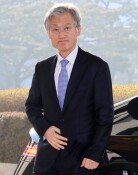[Editorial] Expanding Economic Horizons
[Editorial] Expanding Economic Horizons
Posted October. 26, 2009 08:49,
President Lee Myung-bak in his Southeast Asia tour upgraded bilateral ties with Vietnam to a strategic cooperative partnership and got assurance from Hanoi to allow South Korean participation in infrastructure construction projects. In Phnom Penh, President Lee and Cambodian Prime Minister Hun Sen agreed to expand two-way cooperation to include areas such as mineral resources and broadcast content production and extend the business visa period for South Koreans. At the summit of the Association of Southeast Asian Nations, President Lee and ASEAN leaders reaffirmed close cooperation on the financial crisis, climate change, cultural exchanges and food security and concurred to upgrade bilateral relations to a strategic partnership. In his weeklong tour of Southeast Asia, the president has paved the way for further cooperation with nations in the region.
Vietnamese Prime Minister Nguyen Tan Dung called President Lee brother and Hun Sen showed him the ancient Cambodian temple of Angkor Wat. These actions were affirmations of Seouls strengthened ties with the two countries. In March, President Lee announced a new Asia initiative to transform his country into a regional leader. The plan seeks to have Seoul speak for Asian countries on the international stage by looking at the continent from a new perspective and raising Asian awareness of Korea. His Southeast Asia tour has helped South Korea take the first step toward this goal by improving ties with nations in the region.
With China and Japan maintaining their influence on the region, South Korea might find it tough to emerge as an Asian leader and face setbacks in achieving its goal. The countrys diplomacy, however, should pursue a plus-sum game instead of a zero-sum game. While strengthening trust-based cooperative relations with Beijing and Tokyo, Seoul needs to employ a win-win strategy with other governments in Asia. The International Herald Tribune said yesterday that South Korea has enough confidence and money to exert influence in Asia.
South Korean diplomacy has focused on the United States, China and Russia due to its territorial division and the geopolitical situation of being surrounded by powerful countries. In the 21st century, countries face the same challenges such as the global economic crisis and climate change, so a shift in diplomacy to embrace diverse issues and interests is directly linked to South Koreas survival. The diversification of diplomacy is also critical to resolve the North Korean nuclear program and human rights abuses, which have been dealt with by the United Nations, and for Seoul to raise its voice in the international community.
With abundant natural resources, 52 percent of the worlds population, 21 percent of global GDP and 26 percent of world trade, Asia is comparable to North America and the European Union in economic power. For further economic development, South Korea must make the most of Asias potential. To make President Lees new Asia initiative a success, Seoul must devise sophisticated strategies and pull wisdom from all sectors. This goal cannot be achieved by government efforts alone. Active participation from the private sector is also necessary.





![[천광암 칼럼]장동혁은 대체 왜 이럴까](https://dimg.donga.com/c/138/175/90/1/wps/NEWS/IMAGE/2026/02/22/133399127.1.jpg)

